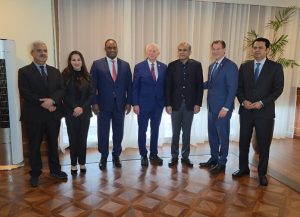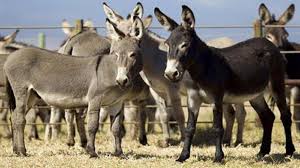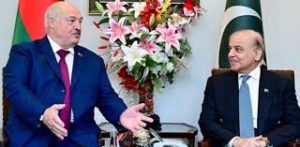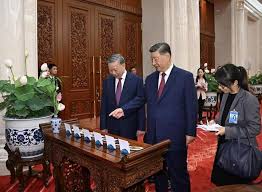Pakistan, China vow to cement ironclad ties

Beijing: Pakistan and China are planning more high-level exchanges and steps to take their relations to even greater heights, Islamabad’s top envoy to Beijing said, with the recent election of Pakistan’s new leadership fueling expectations for fortified bilateral cooperation going forward. Pakistani Ambassador to China Khalil Hashmi said in an exclusive interview with China Daily that the two nations are “resolved to further bolster high-level exchanges, instill additional substance to the already robust bilateral relations, and further fortify the ironclad friendship in the face of a complex geopolitical and regional milieu”.
Hashmi noted that President Xi Jinping was the first foreign leader to send a congratulatory message to both President Asif Ali Zardari and Prime Minister Shehbaz Sharif of Pakistan “in a matter of a few hours” after the announcement of the election results, a diplomatic gesture underscoring the strong ties between the two neighbors. In his messages, Xi underlined his readiness to work with the two leaders in carrying forward the traditional bilateral friendship and advancing pragmatic cooperation in various sectors. Sharif wrote in a post on social media platform X that he wished to extend sincere gratitude to the Chinese president for congratulating him on his reelection. “Look forward to working with him to further strengthen Pakistan-China ironclad friendship and for high-quality development of CPEC as flagship of BRI,” he wrote, referring to the China-Pakistan Economic Corridor and the Belt and Road Initiative. The Pakistani envoy stressed that ties between China and Pakistan, as iron brothers and all-weather strategic cooperative partners, have weathered many storms and achieved many milestones. “They continue to grow from strength to strength. “We have a solid foundation to further expand our relations in economy, trade, investment, industry, science and technology, tourism, education, media and culture,” Hashmi said.
He highlighted the significance of the year 2023 in bilateral ties, as both sides celebrated the solid progress achieved in the first decade of the CPEC. As the development of the CPEC is transitioning to its second phase in 2024 and beyond, Hashmi said both nations “remained committed to jointly building corridors of economic growth, livelihoods, innovation, green development and inclusivity, infused with high-quality development”. The economic corridor has transformed Pakistan’s infrastructure and energy landscape, contributed to significant socioeconomic progress, and laid the foundation for accelerated economic growth, industrialization and more jobs, the envoy said. The CPEC, which is a landmark project of the BRI that includes a variety of infrastructure projects such as roads, railways and oil and gas pipelines, has created a total of 236,000 jobs and built 510 kilometers of highways for the South Asian country, according to the Chinese embassy in Pakistan. As China’s strategic partner on both the bilateral and multilateral fronts, Pakistan has also been actively engaged with China in promoting and forging ahead with President Xi’s vision of a community with a shared future for mankind.
Pakistan, one of the earliest members of the Group of Friends of Global Development Initiative, has been an active partner with China in promoting the landmark initiative, as it aligns well with the United Nations’ Sustainable Development Agenda 2030, Hashmi said. The Global Development Initiative, the Global Security Initiative, the Global Civilization Initiative and the BRI “represent a global road map for a more prosperous, harmonious and peaceful world”, he said. Mushahid Hussain Sayed, the founding chairman of the Pakistan-China Institute and chairman of Pakistan’s Senate Committee on Defence, said that with the country’s new government taking office, the biggest impact will be “on taking CPEC forward with renewed vigor, plus enhanced bilateral trade and stronger diplomatic coordination on key issues”. He highlighted the significance of the commitment from President Xi on the bilateral ties. “As President Xi rightly pointed out, with the world confronted with accelerated changes unseen in a century, the strategic significance of China-Pakistan relations has become more prominent,” he said. “Pakistan-China relations remain solid and substantive, irrespective of any changes in the region or a change of governments, as these are based on mutual interests reinforced by supporting each other’s core interests,” he added.
The Pakistani senator also highlighted the significance of greater cooperation with China through the Shanghai Cooperation Organization. “Both countries oppose any new Cold War, any zero-sum game mindset, or hegemony of any kind, and support an international order based on the UN Charter and international law, with no double standards on any issues,” he said.





